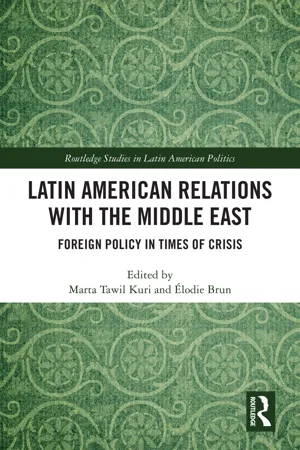2.1 The Local, the Regional, and the Global According to Cambiemos
The new governmental coalition that took Mauricio Macri to Argentina’s presidency in December 2015 marked a turning point in Argentinean politics: for the first time in its democratic history, the government’s Executive branch was not under the hegemony of the Partido Justicialista or the Unión Cívica Radical.
Like each government in Argentina’s history since the 1983 democratic recovery – when a democratic period that would last until today was opened –, Macri’s sought to differentiate itself from its predecessor, Kirchnerism’s. To do so, it drew up a program that entailed deep economic and social transformations as well as changes in the realm of Foreign Policy. These last were based on a different understanding of the international scene. Indeed, Cambiemos government classified Kirchner’s “populist” economic policies as protectionist and its critical views of the international order1 as indications of underdevelopment and Argentina’s isolation from the world (El Día, 2020). The new government redirected the economic model toward a “framed neoliberalism” (Zelicovich, 2018) guided by economic openness and trade liberalization and, at the same time, by maintaining some social welfare policies.
Based on a positive reading of globalization,2 this redirection implied the reshaping of Argentina’s Foreign Policy with the aim of “returning to the world” “free of ideologies.” However, Cambiemos did not establish an equal and horizontal relationship with all countries in the world. Instead, it redefined Argentina’s global alliances focusing on a “Western insertion” (Busso, 2017), which meant strengthening ties with the US and European countries. Barack Obama’s visit to Buenos Aires in March 2016 would become a symbol of this turn.
Through the “return to the world” narrative, driven by a neoliberal economic model based on foreign direct investment, Macri’s government renewed support for the international liberal order and attempted to build a “trustworthy” image of the country in the face of world powers and the international economic establishment. This explains Macri’s presence at the World Economic Forum in Davos just one month after taking office. The same can be affirmed about the commitment to multilateral and global governance institutions – especially those related to economic and trade issues. In 2018, Buenos Aires hosted the World Trade Organization ministerial summit. On that occasion, President Macri stressed that “never before in history has Argentina been this connected to the world as today” (Macri, 2018a). Besides, the South American country applied for membership to the Organisation for Economic Co-operation and Development (OECD) and served as chairman of the G20 Forum, adopting a role as an “honest broker” during the presidential meeting (Deciancio and Tussie, 2019).
It is worth noting that, according to a survey carried out by the Argentinean Council on Foreign Relations (CARI, by its Spanish acronym) in 2015, the reinforcement of occidentalism and the alignment with the US were supported by scholars and politicians, among whom the US image improved between 2010 and 2015. This converged with the identification of terrorism as one of the main international problems for Argentinean society during these years (CARI, 2020).
However, this globalization-friendly reading was altered by a wave of nationalism and protectionism in the West. Although the alignment with the US continued to set the course for Argentinean Foreign Policy even after Donald Trump won the presidential election in November 2016, these global changes led to adjustments in the government’s international strategy. The bonds with China and Russia entered the agenda, the optimistic vision of globalization was blurred, and South-South cooperation was revalued. These movements also coincided with the US decision on raising interest rates, which led capital to leave emergent markets toward the North American economy and particularly affected Argentina and Turkey.
At the regional level, Macri’s victory in the elections signaled another milestone in the transformation of the political cycle in South America, characterized by the decline of progressive governments and their replacement by neoliberal ones. The latter promoted a reduction of state intervention in the economy, prioritizing foreign investment attraction and commodities exportation toward extra-regional markets (Sanahuja and Comini, 2018).
The local and regional turn-to-the-right affected South American-Middle Eastern relations and, unlike the previous period of “booming relations” (Tawil Kuri, 2016), the interregional bonds weakened. This affected the political realm. As an example, in Argentina-Middle Eastern relations, anti-colonial issues like the Palestinian cause and the Malvinas Islands question disappeared from the agenda. This way, except for Israel and Iran, between 2015 and 2019 relations were mainly reduced to trade links.
Concerning Foreign Policy decision-making process, the hardcore of the decisions concentrated on President Macri’s party (PRO), mainly constituted by former Chief Officer Executives (CEOs) and NGOs members (Gené, 2018). Undoubtedly, the strongly corporate nature of the decision-making structure represented another novelty for Argentinean politics. Cambiemos government centralized the Foreign Policy design in the Executive branch, a common place in Latin American countries, as explained by van Klaveren (2013). The Chief of Staff, Marcos Peña Braun, and the Secretary for Strategic Affairs, Fluvio Pompeo, took over the assignment of commanding the president’s international agenda and the articulation with other areas of the state that particip...
